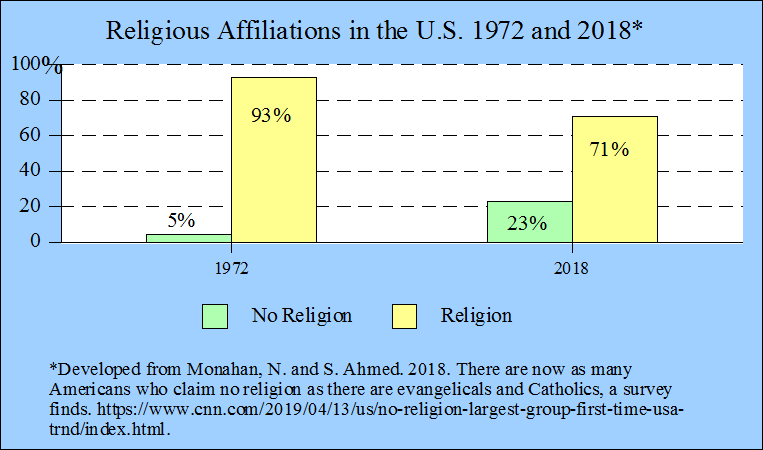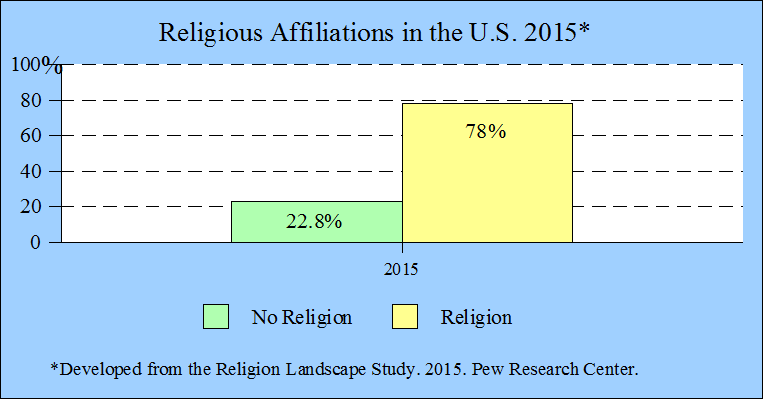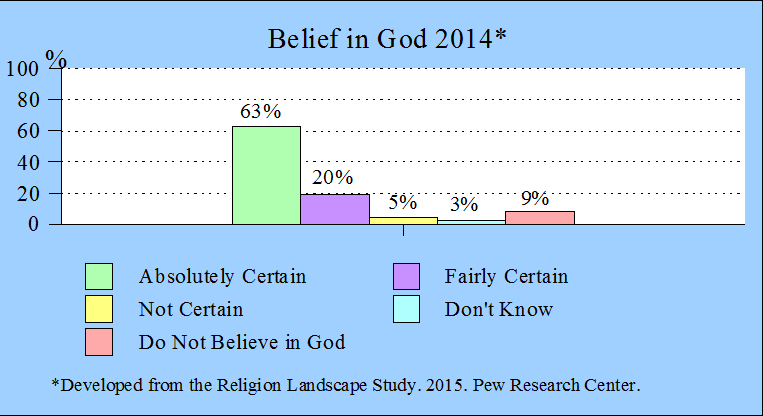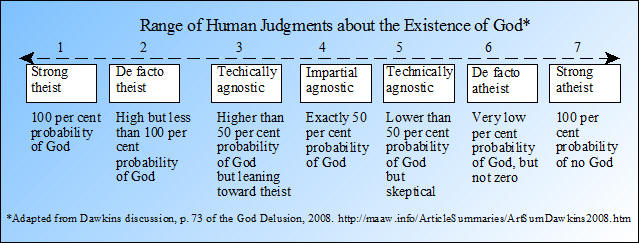
Summary by James R. Martin, Ph.D., CMA
Professor Emeritus, University of South Florida
Religion Main Page |
Political Issues Main Page
Monahan and Ahmed at CNN developed some interesting survey statistics related to changes in religious affiliations in the U.S. from 1972-20181.
The survey results based on interviews with 2,000 people show the following:
Those with no religion increased from 5% in 1972 to 23% in 2018.
Catholics decreased from 27% in 1972 to 23% in 2018.
Evangelicals increased
from 17% in 1972 to 23% in 2018.
Mainline Protestants decreased from 28% in 1972 to 11% in 2018.
Other Affiliations decreased from 21% in 1972 to 14% in 2018.
Overall, those with no religious affiliation increased from 5% to 23% while those with a religious affiliation decreased from 93% to 71%.

The graphic below is from the report by Monahan and Ahmed. For more on these results, click on the graphic, or the link in the first footnote at the end of this summary.
The Pew Research Center's 2015 Religion Landscape Study2
The Pew Religion Landscape Study includes survey data from 35,000 Americans and shows the following:
Christian 70.6%
Evangelical Protestant 25.4%
Mainline Protestant 14.7%
Historically black Protestant 6.5%
Catholic 20.8%
Mormon 1.6%
Orthodox Christian 0.5%
Jehovah's Witness 0.8%
Other Christian 0.4%
Non Christian 5.9%
Jewish 1.9%
Muslim 0.9%
Buddhist 0.7%
Hindu 0.7%
Other World Religions 0.3%
Other Faiths 1.5%
Unaffiliated or No Religion 22.8%
Atheist 3.1%
Agnostic 4.0%
Nothing in particular 15.8%
Don't know .6%

Belief in God: Pew Research Center's 2014 Survey
Absolutely Certain 63%
Fairly Certain 20%
Not too or not at all Certain 5%
Don't Know 3%
Do Not believe in God 9%

Dawkin's Range of Judgments about the Existence of God3
Dawkins developed a seven-point scale of judgments from 1 to 7 on the question of God's existence where 1 is a strong theist belief of 100 percent probability that God exist, and 7 is a strong atheist belief of 100 percent probability that God does not exist. According to Dawkins, there is no justification for regarding God's existence immune from consideration along a range of probabilities.

It is interesting to note that both polls show about 23% of those surveyed are in the no religion category, but the 2014 survey shows 83% are either absolutely certain, or fairly certain that God exist. Even those with no religion tend to believe in God. The Pew research also shows that only 72% believe in heaven and only 58% believe in hell.
___________________________________________
Footnotes:
1 Monahan, N. and S. Ahmed. 2018. There are now as many Americans who claim no religion as there are evangelicals and Catholics, a survey finds. CNN. (Link to the CNN report).
2 Religious Landscape Study. 2015. Pew Research Center. (Link to the Study).
3 Dawkins, R. 2008. The God Delusion. A Mariner Book, Houghton Mifflin Company. (Summary).
Related summaries and links:
Martin, M. and K. Augustine. 2015. The Myth of an Afterlife: The Case against Life After Death. Rowland & Littlefield Publishers. (Note and Contents).
Prothero, S. 2007. Religious Literacy: What Every American Needs to Know - And Doesn't. Harper San Francisco. (Summary).
Shermer, M. 2015. The Moral Arc: How Science and Reason Lead Humanity Toward Truth, Justice, and Freedom. Henry Holt and Co. moralarc.org/
Shermer, M. and P. Linse. 2001. The Baloney Detection Kit. Altadena, CA: Millennium Press. Ten questions to ask when examining a claim. 1. How reliable is the source of the claim? 2. Does the source make similar claims. 3. Have the claims been verified by someone else? 4. Does this fit with the way the world works? 5. Has anyone tried to disprove the claim? 6. Where does the preponderance of evidence point? 7. Is the claimant playing by the rules of science? 8. Is the claimant providing positive evidence? 9. Does the new theory account for as many phenomena as the old theory. 10. Are personal beliefs driving the claim? baloney-detection-kit/